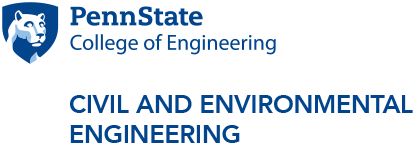
Requirements for Transportation Engineering Applicants
Minimum course requirements for transportation engineering applicants are listed below. Applicants who do not meet these minimum course requirements can still be admitted on a provisional basis until the coursework is completed elsewhere or as part of the graduate studies at Penn State.
Two semesters of calculus
Integration and differentiation, ordinary differential equations
- MATH 140 and 141 – coverage of calculus with analytical geometry, parts I and II
One course in matrix algebra
Matrix algebra, vectors, linear transformations, solution to systems of linear equations, determinants, matrix inverses, concepts of rank and dimension, eigenvalues, eigenvectors
- MATH 220 – Matrices
One course in introductory scientific programming
Data and control structures, debugging routines, some knowledge of numerical analysis a plus
- CMPSC 201 – Programming for Engineers with C++ or CMPSC 202 – Programming for Engineers with Fortran
One course in introductory transportation engineering
Concepts relating to design principles, traffic operations, planning principles, multimodal systems
- C E 321 – Introduction to Transportation Engineering**
One course in economics
Concepts on micro and macro economics, inter-relationships of consumers, governments, businesses, labor and financial institutions
- ECON 002 – Microeconomic Analysis or ECON 004 – Macroeconomic Analysis or ECON 014 – Principles of Economics
One course in elementary statistics
Introduction to distribution and sampling; testing hypotheses, probability concepts
- STAT 401 – Experimental Methods or STAT 415 – Introduction to Mathematical Statistics.
**Students who have not taken an introductory course in transportation engineering may still be considered if other requirements are met. If admitted, the graduate applicant must enroll in and complete CE 321 within two semesters at Penn State with a grade of A– or better.



